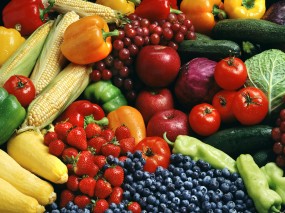- Fitness (19)
- News & Reviews (25)
- Nutrition (20)
- Science (10)
- Supplements (6)
- Technologies (8)
- The Arts (9)
Your Brain on Blueberries
January 16th, 2011
 From Scientific American: Chemical compounds common to berries, tofu, tea and other foods can shore up memory and boost brainpower.
From Scientific American: Chemical compounds common to berries, tofu, tea and other foods can shore up memory and boost brainpower.
What is blue, sweet and juicy and may help ward off those nagging memory lapses? If you guessed blueberries, you would be right… they may protect our brain.
Emerging research suggests that compounds in blueberries known as flavonoids may improve memory, learning and general cognitive function, including reasoning skills, decision making, verbal comprehension and numerical ability. In addition, studies comparing dietary habits with cognitive function in adults hint that consuming flavonoids may help slow the decline in mental facility that is often seen with aging and might even provide protection against disorders such as Alzheimer’s and Parkinson’s.
To date, scientists have identified more than 6,000 flavonoid-containing foods. They are widely distributed in fruits and vegetables, cereal grains, cocoa, soy foods, tea and wine.
How much do we need? A Cincinnati study found a 30% improvement in a group of adults older than 75 with mild memory loss who drank two cups of blueberry juice a day (the equivalent of five cups of blueberries). One study in England asked peope to add flavonoid containing foods to their meals: either soy products, supplements (Gingko biloba or pine bark extract) or a cocoa-containing beverage. Flavonoid consumption improved cognition and fine motor skills. Amounts needed to produce the improvements? One and a half cups of tofu or two cups of soy milk, 120 mg. of gingko, 150 mg. of pine bark extract, or 172 mg of cocoa flavonoids (the equivalent of 10.5 ounces of dark chocolate).
But wait–these studies give single-source quantities! If you have flavonoids from a variety of sources you’ll need moderate amounts of each one. The bottom line: eat your fruits and vegetables!
Article (behind a paywall)
Filed under News & Reviews, Nutrition | Comments Off on Your Brain on BlueberriesDiet, Lifestyle and Sleep
October 21st, 2010
 By Nedeltcheva AV et al: “The barriers to maintaining healthy body weight are complex and include physiologic, psychological, and social factors” according to an editorial in an Annals study.
By Nedeltcheva AV et al: “The barriers to maintaining healthy body weight are complex and include physiologic, psychological, and social factors” according to an editorial in an Annals study.
“If your goal is to lose fat, skipping sleep is like poking sticks in your bicycle wheels,” Penev said. “Cutting back on sleep, a behavior that is ubiquitous in modern society, appears to compromise efforts to lose fat through dieting. In our study it reduced fat loss by 55 percent.”
“Perhaps sleep should be included as part of the lifestyle package that traditionally has focused on diet and exercise…” Continue reading »
Filed under Fitness | Comments Off on Diet, Lifestyle and SleepGlobal & Personal Energies
September 17th, 2010

“If you just painted all the black tarpaper roofs on apartment houses in New York City white — if you just did that one thing — it would save a huge amount of electricity, cut greenhouse gasses and put hundreds and hundreds of people to work.” — President Bill Clinton
Green rooftops would be good too, and maybe produce some foods! — Dr. Cathie
About his nearly-vegan diet:
“Since 1986 several hundred people who have tried essentially a plant-based diet — not ingesting any cholesterol from any source — have seen their bodies start to heal themselves; break up the arterial blockage, break up the calcium deposits around the heart. 82% of the people who’ve done this have had that result, so I wanna see if I can be one of them.” — ibid.
Filed under News & Reviews | Comments Off on Global & Personal EnergiesHigh Cost of Cheap Foods
September 1st, 2010
 By Mark Hyman MD: “I was in the grocery store yesterday. While I was squeezing avocados to pick just the right ones for my family’s dinner salad, I overheard a conversation from a couple who had also picked up a fruit.
By Mark Hyman MD: “I was in the grocery store yesterday. While I was squeezing avocados to pick just the right ones for my family’s dinner salad, I overheard a conversation from a couple who had also picked up a fruit.
“Oh, these avocados look good, let’s get some.”
Then looking up at the price, they said, “Two for five dollars!” Dejected, they put the live avocado back and walked away from the vegetable aisle toward the aisles full of dead, boxed, canned, packaged goods where they can buy thousands of calories of poor-quality, nutrient-poor, factory-made, processed foods filled with sugar, fat, and salt for the same five dollars. This is the scenario millions of Americans struggling to feed their families face every day…”
Filed under Nutrition | Comments Off on High Cost of Cheap FoodsDNA + Lifestyle = New DNA
August 28th, 2010
 By Dr. David Katz, Director of Yale University’s Prevention Research Center
By Dr. David Katz, Director of Yale University’s Prevention Research Center
We have long known that lifestyle has a powerful influence on health across a wide array of outcomes. It is not news to you that eating well, being active, controlling your weight, managing stress and not smoking, for instance, can influence your fate.
But we have tended to think in terms of “nature versus nurture” — with lifestyle and genetic influences on health as independent and potentially competing forces. This study, and others like it, ostensibly change the game. They suggest that lifestyle and genetics are not independent after all, but interact. Even our genes are influenced by lifestyle choices. We can, it seems, nurture nature.
To a Preventive Medicine specialist like me, this is of profound importance. Complacency and fatalism are enemies of disease prevention. For many people, the notion that their medical destiny is written in their genes is a disincentive to take matters into their own hands.
Filed under News & Reviews | Comments Off on DNA + Lifestyle = New DNA



